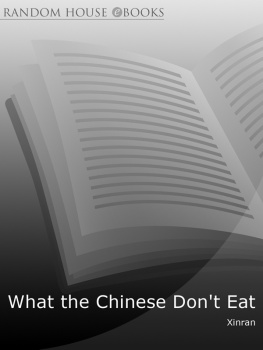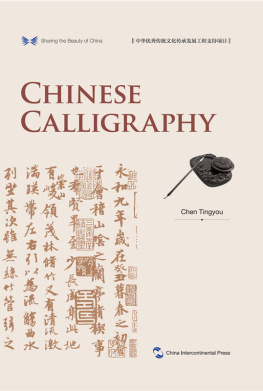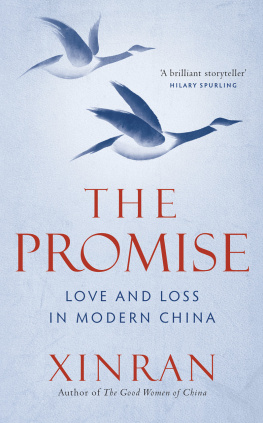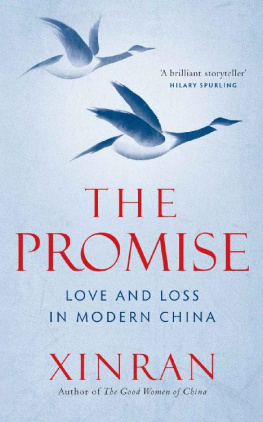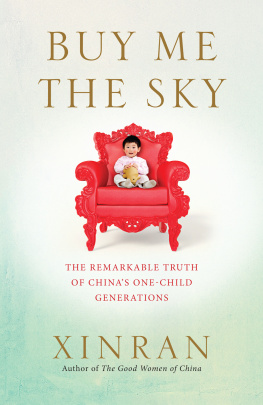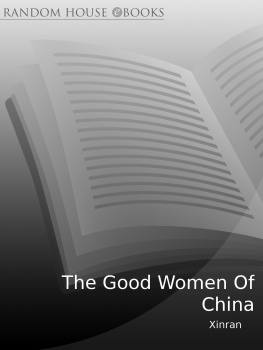Xinran Xinran - What the Chinese Dont Eat
Here you can read online Xinran Xinran - What the Chinese Dont Eat full text of the book (entire story) in english for free. Download pdf and epub, get meaning, cover and reviews about this ebook. year: 2006, publisher: Vintage Books, genre: Detective and thriller. Description of the work, (preface) as well as reviews are available. Best literature library LitArk.com created for fans of good reading and offers a wide selection of genres:
Romance novel
Science fiction
Adventure
Detective
Science
History
Home and family
Prose
Art
Politics
Computer
Non-fiction
Religion
Business
Children
Humor
Choose a favorite category and find really read worthwhile books. Enjoy immersion in the world of imagination, feel the emotions of the characters or learn something new for yourself, make an fascinating discovery.
- Book:What the Chinese Dont Eat
- Author:
- Publisher:Vintage Books
- Genre:
- Year:2006
- Rating:5 / 5
- Favourites:Add to favourites
- Your mark:
- 100
- 1
- 2
- 3
- 4
- 5
What the Chinese Dont Eat: summary, description and annotation
We offer to read an annotation, description, summary or preface (depends on what the author of the book "What the Chinese Dont Eat" wrote himself). If you haven't found the necessary information about the book — write in the comments, we will try to find it.
What the Chinese Dont Eat — read online for free the complete book (whole text) full work
Below is the text of the book, divided by pages. System saving the place of the last page read, allows you to conveniently read the book "What the Chinese Dont Eat" online for free, without having to search again every time where you left off. Put a bookmark, and you can go to the page where you finished reading at any time.
Font size:
Interval:
Bookmark:

XINRAN
Dont Eat
The Collected Guardian Columns

This eBook is copyright material and must not be copied, reproduced, transferred, distributed, leased, licensed or publicly performed or used in any way except as specifically permitted in writing by the publishers, as allowed under the terms and conditions under which it was purchased or as strictly permitted by applicable copyright law. Any unauthorised distribution or use of this text may be a direct infringement of the authors and publishers rights and those responsible may be liable in law accordingly.
Version 1.0
Epub ISBN 9781407065700
www.randomhouse.co.uk
Published by Vintage 2006
2 4 6 8 10 9 7 5 3 1
Copyright Xinran 2006
Xinran has asserted her right under the Copyright, Designs and Patents Act 1988 to be identified as the author of this work
This book is sold subject to the condition that it shall not, by way of trade or otherwise, be lent, resold, hired out, or otherwise circulated without the publishers prior consent in any form of binding or cover other than that in which it is published and without a similar condition including this condition being imposed on the subsequent purchaser
These columns were first published in the Guardian newspaper between 2nd June 2003 and 9th September 2005
This book is published in association with Guardian Books. Guardian Books is an imprint of Guardian Newspapers Limited. The Guardian is a registered trademark of Guardian Media Group plc.

First published in Great Britain in 2006 by Vintage
Vintage Random House, 20 Vauxhall Bridge Road, London SW1 2SA
Random House Australia (Pty) Limited 20 Alfred Street, Milsons Point, Sydney, New South Wales 2061, Australia
Random House New Zealand Limited 18 Poland Road, Glenfield, Auckland 10, New Zealand
Random House (Pty) Limited Isle of Houghton, Corner of Boundary Road & Carse OGowrie, Houghton 2198, South Africa
The Random House Group Limited Reg. No. 954009 www.randomhouse.co.uk/vintage
A CIP catalogue record for this book is available from the British Library
ISBN 9780099501527 (from Jan 2007) ISBN 009950152X
Papers used by Random House are natural, recyclable products made from wood grown in sustainable forests. The manufacturing processes conform to the environmental regulations of the country of origin
Typeset by Palimpsest Book Production Limited, Polmont, Stirlingshire Printed and bound in Great Britain by Bookmarque Ltd, Croydon, Surrey
WHAT THE CHINESE DONT EAT
Xinran was born in Beijing in 1958 and was a successful journalist and radio presenter in China. In 1997 she moved to London, where she began work on her seminal book about Chinese womens lives, The Good Women of China, which has become an international bestseller. Her most recent book is Sky Burial.
ALSO BY XINRAN
The Good Women of China Sky Burial
The first time I came across the Guardian was in the 1970s in a foreign media research textbook. A tiny note followed the introduction: The Guardian is a left-wing newspaper, considered one of the top ten anti-Communist papers. The Chinese media did, nevertheless, use the occasional article from the Guardian to illustrate their disapproval of Margaret Thatchers foreign policy, including the Falklands War.
The Guardian was also on a forbidden media list at the radio station I worked at from 1989 to 1997. The list told us which western newspapers would attack China and should never be believed. Therefore I never thought that I, a Chinese woman though admittedly one brought up with a flak-jacket to defend the Guardian and its influence would ever have the opportunity to write a fortnightly column in this newspaper for more than two years.
What have I really liked about being a columnist for the Guardian? Its a hard question to answer; in the same way as its difficult to know why I love cheese when most Chinese people dont. The first thing that comes to my mind is the impression that I got from the restaurants where the Guardian staff took me for lunch. These restaurants were not very grand which matched my level of writing; they were not snooty a Chinese woman was always treated as a welcome guest; they were European, but comfortable with different cultures they were keen for me to write about the differences with China; and they all offered unforgettable tastes and Ive always loved my food. Every meal replenished my energy for digging into my Chinese thoughts.
The second thing is to do with the male readers of my column. Since the publication of my books, The Good Women of China and Sky Burial, in over thirty languages, I have met so many female readers and admirers but not many male ones. Men dont read books by women, I have been constantly told all over the world. Why? Because most men believe only women with nothing else to do housewives and prostitutes, for instance have time to write books. I was also told that men prefer reading papers. This last idea rings true, judging by the responses Ive had from my column, many more of which have come from men than from women. The first person to suggest I publish my columns together as a book was a British man. Also, the only two people I know who collected all of them are an Australian businessman in Beijing and a German journalist in Hamburg. Obviously this has been a real chance for me to learn what men think about Chinese culture.
The third thing I have liked is to do with the responses of some of the 100,000 families around the world who have adopted Chinese daughters.
Dear Xinran,
My daughter is seven. I adopted her when she was three. All I know is that she was abandoned at 18 months in Chengdu. For every child who finds a home, there are so many left behind. I think of what life will be like for the girls who grow up in institutions. And I always think of my daughters birth mother and wonder if she has a huge hole in her heart through having to live without this wonderful child. I cant even imagine the collective sorrow all these birth mothers must feel.
Did you ever interview any of these women who were forced to give up children because of the one child law? Is there any possibility of writing their stories? I know all of our Chinese daughters will one day be searching for answers.
Some families also sent videos to me with their adopted daughters questions:
Why my Chinese mum didnt want me?
Does my Chinese mum miss me?
What is Chinese culture? Why people say it is take-way? Is it true?
So, apart from digging out my answers for them in my writing and my interviews in China between 1989 and 1997 when I was a radio presenter in Henan and Jiangsu, I also set up the Mothers Bridge of Love, a charity which tries to bridge the gap between China and rest of the world, between the culture of ones birthplace and ones home, between rich and poor. I quickly became a builder with a lot of hard labour to perform, carrying books to family events, raising money and even holding costumes during performances of Chinese dance.
Each column I wrote provoked more questions and stories from my readers, driving me on to the next. One of my earliest columns started with how I got the first western kiss on my face from my students at London University. My writing is based on my own experiences and views, which have been weathered by Chinese traditional culture and modern China. I have written about what the Chinese dont eat; why we see washing feet every day as so important; how the Chinese fish philosophy really helped my life choices; how my Chinese knowledge and language is lost in a fast-changing motherland; my conversations with a wild-flower seller at Xian about the punishments of opening the Terracotta Warriors; the football craziness at my radio station and home; and what makes a good woman in mens eyes. I have also written about many of my interviews with Chinese women; about how some tried to commit suicide; how some of them are struggling with modern life including how to see sex; and how some still treat Mao as a Chinese God.
Font size:
Interval:
Bookmark:
Similar books «What the Chinese Dont Eat»
Look at similar books to What the Chinese Dont Eat. We have selected literature similar in name and meaning in the hope of providing readers with more options to find new, interesting, not yet read works.
Discussion, reviews of the book What the Chinese Dont Eat and just readers' own opinions. Leave your comments, write what you think about the work, its meaning or the main characters. Specify what exactly you liked and what you didn't like, and why you think so.

